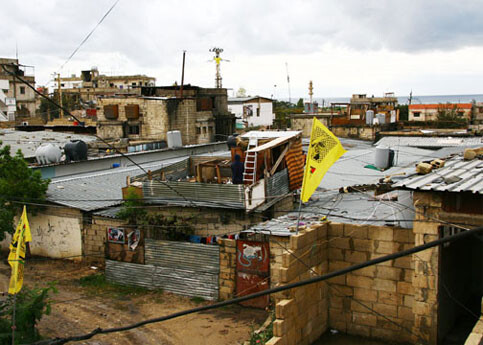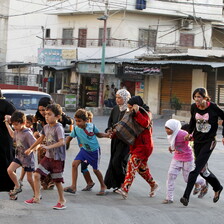Electronic Lebanon 9 December 2007

Ain al-Hilweh is the largest Palestinian refugee camp in Lebanon (Hugh Macleod/IRIN)
AIN AL-HILWEH, 9 December (IRIN) - A desperately needed hospital in Lebanon’s largest and most violent Palestinian refugee camp has been unable to open on time because funds to buy beds and other basic medical equipment have dried up.
The US$5m al-Quds hospital in Ain al-Hilweh, just outside the southern port city of Sidon, is the single largest investment in the camp’s 60-year history and aims to treat a range of chronic diseases, heart problems, cancers and nervous disorders suffered by Ain al-Hilweh residents. It also aims to have a children’s wing and an intensive care unit.
But hospital director Ibrahim Marshoud told IRIN the hospital was still some $2m from completion after international donations to the Palestinian charity Badr Foundation, which has paid for the hospital, ceased in recent months.
“The Badr Foundation is waiting for money. Now the hospital can only undertake minor operations; we still need 36 beds, incubators, scanners, electrical beds and five kidney dialysis machines,” said Marshoud, a former member of the British Medical Council and previously senior medical adviser to the UN agency which assists Palestinian refugees, UNRWA.
“The health problems in the camp are both disease and the environment. The streets are an environmental disease, while medically chronic diseases are extremely common, such as diabetes, hyper-tension and cancers.”
UNRWA says the camp is home to nearly 46,000 refugees, while estimates by Fatah, the dominant faction in the camp, say around 80,000 people are crammed into the camp’s 1.5 square kilometers.
Patients dying for lack of medicines
UNRWA runs two clinics in Ain al-Hilweh. According to statistics from the end of last December, nearly 3,500 people in the camp are under treatment at the clinics for diabetes or hyper-tension.
Heart surgery costs around US $7,000, according to Palestinian leaders and doctors in the camp, a price almost no-one can afford to pay, with unemployment in the camp hitting 80 percent. The al-Quds hospital aims to offer free treatment for heart disease.
According to UNRWA, Lebanon has the highest percentage of all Palestinian refugees living in abject poverty, and the worst of that is felt inside the 12 official refugee camps, home to just over half the country’s 400,000 registered Palestinians.
The hospital, which has taken four years to build, is largely the brainchild of Mounir Maqdah, representative in south Lebanon for the Palestine Liberation Organization, of which Fatah is the dominant faction. Maqdah is the senior figure among Palestinian leaders in Ain al-Hilweh.
With Palestinians in Lebanon barred from opening their own clinics — Palestinians are barred from over 70 professional jobs — and with a decades-old Lebanese policy of preventing imports into the camp that could be used for its improvement, Maqdah had to use considerable “influence,” said Marshoud, just to get the hospital built.
Both Marshoud and Yassein Abu Saleh, a hospital technician, said patients were dying because they only received around half the medicine they needed from UNRWA and other Palestinian associations.
“People cannot afford to seek medical treatment outside the camp,” said Saleh, “and they can hardly afford to pay for medicine inside the camp.”
Marshoud said an Ain al-Hilweh child diagnosed with blood disease such as sickle cell anemia would live a maximum of 20 years, while in the West the child could live 60 years, simply because the expensive medicine and blood transfusions needed are not available in the camp.
Case study
Wissam Oweid said he got a fever when he was a baby, but his parents were too poor to afford proper medical care. Today the 26-year-old appears severely disabled, unable to speak clearly or to control basic limb movements.
Locals, some of whom scorned and hit Oweid, said the young man takes Artane pills every day, paid for by Fatah, and blamed his condition on nervous shock from when Israel bombed the camp during the civil war in the 1980s. Artane is used to treat the nervous disorders of Parkinson’s disease.
“I wanted to travel to get better medicine but I couldn’t,” said Oweid, his body contorted with the effort of speaking. “If I could travel out of the camp perhaps I could get normal.”
UNRWA Commissioner General Karen AbuZayd told a Beirut press conference in November that UNRWA’s camp rehabilitation program — begun two years ago at the request of Prime Minister Fouad Siniora’s government, which broke with a long-standing Lebanese policy of obstructing the renovation or expansion of the 12 camps — would not be forgotten.
UNRWA had received $26m out of a budget request to donors of $50m for the rehabilitation program and had spent up to $8m so far, she said.
This item comes to you via IRIN, a UN humanitarian news and information service, but may not necessarily reflect the views of the United Nations or its agencies. All IRIN material may be reposted or reprinted free-of-charge; refer to the copyright page for conditions of use. IRIN is a project of the UN Office for the Coordination of Humanitarian Affairs.
Related Links


